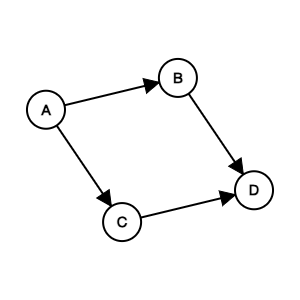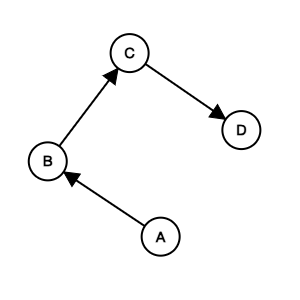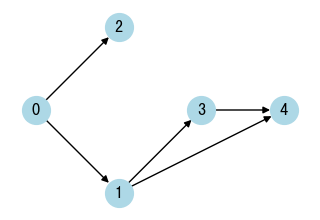Topological Sort¶
Table of Contents¶
- 207. Course Schedule (Medium)
- 210. Course Schedule II (Medium)
- 269. Alien Dictionary (Hard) 👑
- 1203. Sort Items by Groups Respecting Dependencies (Hard)
- 1857. Largest Color Value in a Directed Graph (Hard)
207. Course Schedule¶
-
LeetCode | LeetCode CH (Medium)
-
Tags: depth first search, breadth first search, graph, topological sort
- Return true if it is possible to finish all courses, otherwise return false.
- Dependency relationships imply the topological sort algorithm.
- Cycle detection
- Topological Sort
- DAG (Directed Acyclic Graph)
- Time complexity: O(V+E)
- Space complexity: O(V+E)
- Prerequisites: Indegree (Look at the problem 1557. Minimum Number of Vertices to Reach All Nodes)
- Indegree: Number of incoming edges to a vertex
- Applications: task scheduling, course scheduling, build systems, dependency resolution, compiler optimization, etc.


Course to prerequisites mapping
flowchart LR
0((0)) --> 1((1))
0((0)) --> 2((2))
1((1)) --> 3((3))
3((3)) --> 4((4))
1((1)) --> 4((4))Prerequisites to course mapping
flowchart LR
1((1)) --> 0((0))
2((2)) --> 0((0))
3((3)) --> 1((1))
4((4)) --> 3((3))
4((4)) --> 1((1))| course | 0 | 0 | 1 | 1 | 3 |
|---|---|---|---|---|---|
| prerequisite | 1 | 2 | 3 | 4 | 4 |
| index | 0 | 1 | 2 | 3 | 4 |
|---|---|---|---|---|---|
| in-degree | 0 | 0 | 0 | 0 | 0 |
Initialize
- graph
| prerequisite | 1 | 2 | 3 | 4 |
|---|---|---|---|---|
| course | [0] |
[0] |
[1] |
[1, 3] |
- in-degree
| 0 | 1 | 2 | 3 | 4 | |
|---|---|---|---|---|---|
| in-degree | 2 | 2 | 0 | 1 | 0 |
- queue:
[2, 4] - pop
2from the queue
flowchart LR
1((1)) --> 0((0))
3((3)) --> 1((1))
4((4)) --> 3((3))
4((4)) --> 1((1))| 0 | 1 | 2 | 3 | 4 | |
|---|---|---|---|---|---|
| in-degree | 1 | 2 | 0 | 1 | 0 |
- queue:
[4] - pop
4from the queue
flowchart LR
1((1)) --> 0((0))
3((3)) --> 1((1))| 0 | 1 | 2 | 3 | 4 | |
|---|---|---|---|---|---|
| in-degree | 1 | 1 | 0 | 0 | 0 |
- queue:
[3] - pop
3from the queue
flowchart LR
1((1)) --> 0((0))| 0 | 1 | 2 | 3 | 4 | |
|---|---|---|---|---|---|
| in-degree | 1 | 0 | 0 | 0 | 0 |
- queue:
[1] - pop
1from the queue
flowchart LR
0((0))| 0 | 1 | 2 | 3 | 4 | |
|---|---|---|---|---|---|
| in-degree | 0 | 0 | 0 | 0 | 0 |
- queue:
[0] - pop
0from the queue - All courses are taken. Return
True.
207. Course Schedule - Python Solution
from collections import defaultdict, deque
from typing import List
# BFS (Kahn's Algorithm)
def canFinishBFS(numCourses: int, prerequisites: List[List[int]]) -> bool:
graph = defaultdict(list)
indegree = defaultdict(int)
for crs, pre in prerequisites:
graph[pre].append(crs)
indegree[crs] += 1
q = deque([i for i in range(numCourses) if indegree[i] == 0])
count = 0
while q:
crs = q.popleft()
count += 1
for nxt in graph[crs]:
indegree[nxt] -= 1
if indegree[nxt] == 0:
q.append(nxt)
return count == numCourses
# DFS + Set
def canFinishDFS1(numCourses: int, prerequisites: List[List[int]]) -> bool:
graph = defaultdict(list)
for crs, pre in prerequisites:
graph[crs].append(pre)
visiting = set()
def dfs(crs):
if crs in visiting: # cycle detected
return False
if graph[crs] == []:
return True
visiting.add(crs)
for pre in graph[crs]:
if not dfs(pre):
return False
visiting.remove(crs)
graph[crs] = []
return True
for crs in range(numCourses):
if not dfs(crs):
return False
return True
# DFS + List
def canFinishDFS2(numCourses: int, prerequisites: List[List[int]]) -> bool:
graph = defaultdict(list)
for pre, crs in prerequisites:
graph[crs].append(pre)
# 0: init, 1: visiting, 2: visited
status = [0] * numCourses
def dfs(crs):
if status[crs] == 1: # cycle detected
return False
if status[crs] == 2:
return True
status[crs] = 1
for pre in graph[crs]:
if not dfs(pre):
return False
status[crs] = 2
return True
for crs in range(numCourses):
if not dfs(crs):
return False
return True
prerequisites = [[0, 1], [0, 2], [1, 3], [1, 4], [3, 4]]
print(canFinishBFS(5, prerequisites)) # True
print(canFinishDFS1(5, prerequisites)) # True
print(canFinishDFS2(5, prerequisites)) # True
207. Course Schedule - C++ Solution
#include <functional>
#include <iostream>
#include <queue>
#include <vector>
using namespace std;
class Solution {
public:
// BFS
bool canFinishBFS(int numCourses, vector<vector<int>> &prerequisites) {
vector<vector<int>> graph(numCourses);
vector<int> indegree(numCourses, 0);
for (auto &pre : prerequisites) {
graph[pre[1]].push_back(pre[0]);
indegree[pre[0]]++;
}
queue<int> q;
for (int i = 0; i < numCourses; i++) {
if (indegree[i] == 0) {
q.push(i);
}
}
int cnt = 0;
while (!q.empty()) {
int cur = q.front();
q.pop();
cnt++;
for (int nxt : graph[cur]) {
indegree[nxt]--;
if (indegree[nxt] == 0) {
q.push(nxt);
}
}
}
return cnt == numCourses;
}
// DFS
bool canFinishDFS(int numCourses, vector<vector<int>> &prerequisites) {
vector<vector<int>> graph(numCourses);
for (auto &pre : prerequisites) {
graph[pre[1]].push_back(pre[0]);
}
// 0: not visited, 1: visiting, 2: visited
vector<int> state(numCourses, 0);
function<bool(int)> dfs = [&](int pre) -> bool {
state[pre] = 1; // visiting
for (int crs : graph[pre]) {
if (state[crs] == 1 || (state[crs] == 0 && dfs(crs))) {
return true;
}
}
state[pre] = 2; // visited
return false;
};
for (int i = 0; i < numCourses; i++) {
if (state[i] == 0 && dfs(i)) {
return false;
}
}
return true;
}
};
int main() {
Solution sol;
vector<vector<int>> prerequisites = {{1, 0}, {2, 1}, {3, 2}, {4, 3},
{5, 4}, {6, 5}, {7, 6}, {8, 7},
{9, 8}, {10, 9}};
int numCourses = 11;
cout << sol.canFinishBFS(numCourses, prerequisites) << endl;
cout << sol.canFinishDFS(numCourses, prerequisites) << endl;
return 0;
}
210. Course Schedule II¶
-
LeetCode | LeetCode CH (Medium)
-
Tags: depth first search, breadth first search, graph, topological sort
- Return the ordering of courses you should take to finish all courses. If there are multiple valid answers, return any of them.

210. Course Schedule II - Python Solution
from collections import defaultdict, deque
from typing import List
# 1. BFS - Kahn's Algorithm
def findOrderBFS(numCourses: int, prerequisites: List[List[int]]) -> List[int]:
graph = defaultdict(list)
indegree = defaultdict(int)
for crs, pre in prerequisites:
graph[pre].append(crs)
indegree[crs] += 1
q = deque([i for i in range(numCourses) if indegree[i] == 0])
order = []
while q:
pre = q.popleft()
order.append(pre)
for crs in graph[pre]:
indegree[crs] -= 1
if indegree[crs] == 0:
q.append(crs)
return order if len(order) == numCourses else []
# 2. DFS + Set
def findOrderDFS1(
numCourses: int, prerequisites: List[List[int]]
) -> List[int]:
adj = defaultdict(list)
for crs, pre in prerequisites:
adj[crs].append(pre)
visit, cycle = set(), set()
order = []
def dfs(crs):
if crs in cycle:
return False
if crs in visit:
return True
cycle.add(crs)
for pre in adj[crs]:
if not dfs(pre):
return False
cycle.remove(crs)
visit.add(crs)
order.append(crs)
return True
for crs in range(numCourses):
if not dfs(crs):
return []
return order
# 3. DFS + List
def findOrderDFS2(
numCourses: int, prerequisites: List[List[int]]
) -> List[int]:
adj = defaultdict(list)
for pre, crs in prerequisites:
adj[crs].append(pre)
# 0: not visited, 1: visiting, 2: visited
state = [0] * numCourses
order = []
def dfs(crs):
if state[crs] == 1:
return False
if state[crs] == 2:
return True
state[crs] = 1
for pre in adj[crs]:
if not dfs(pre):
return False
state[crs] = 2
order.append(crs)
return True
for crs in range(numCourses):
if not dfs(crs):
return []
return order[::-1]
numCourses = 5
prerequisites = [[0, 1], [0, 2], [1, 3], [1, 4], [3, 4]]
print(findOrderBFS(numCourses, prerequisites)) # [2, 4, 3, 1, 0]
print(findOrderDFS1(numCourses, prerequisites)) # [4, 3, 1, 2, 0]
print(findOrderDFS2(numCourses, prerequisites)) # [4, 3, 2, 1, 0]
210. Course Schedule II - C++ Solution
#include <iostream>
#include <queue>
#include <vector>
using namespace std;
class Solution {
public:
// BFS
vector<int> findOrderBFS(int numCourses,
vector<vector<int>> &prerequisites) {
vector<vector<int>> graph(numCourses);
vector<int> indegree(numCourses, 0);
for (auto &pre : prerequisites) {
graph[pre[1]].push_back(pre[0]);
indegree[pre[0]]++;
}
queue<int> q;
for (int i = 0; i < numCourses; i++)
if (indegree[i] == 0) q.push(i);
vector<int> order;
while (!q.empty()) {
int cur = q.front();
q.pop();
order.push_back(cur);
for (int nxt : graph[cur]) {
indegree[nxt]--;
if (indegree[nxt] == 0) q.push(nxt);
}
}
return (int)order.size() == numCourses ? order : vector<int>{};
}
};
int main() {
Solution obj;
vector<vector<int>> prerequisites{{1, 0}, {2, 0}, {3, 1}, {3, 2}};
vector<int> res = obj.findOrderBFS(4, prerequisites);
for (size_t i = 0; i < res.size(); i++) cout << res[i] << "\n";
return 0;
}
269. Alien Dictionary¶
-
LeetCode | LeetCode CH (Hard)
-
Tags: array, string, depth first search, breadth first search, graph, topological sort
- Return the correct order of characters in the alien language.
269. Alien Dictionary - Python Solution
from collections import defaultdict, deque
from typing import List
# BFS - Kahn's algorithm (Topological Sort)
def alienOrderBFS(words: List[str]) -> str:
graph = defaultdict(set)
indegree = {c: 0 for word in words for c in word}
for i in range(len(words) - 1):
w1, w2 = words[i], words[i + 1]
minLen = min(len(w1), len(w2))
if len(w1) > len(w2) and w1[:minLen] == w2[:minLen]:
return ""
for j in range(minLen):
if w1[j] != w2[j]:
if w2[j] not in graph[w1[j]]:
graph[w1[j]].add(w2[j])
indegree[w2[j]] += 1
break
q = deque([c for c in indegree if indegree[c] == 0])
result = []
while q:
char = q.popleft()
result.append(char)
for neighbor in graph[char]:
indegree[neighbor] -= 1
if indegree[neighbor] == 0:
q.append(neighbor)
return "".join(result) if len(result) == len(indegree) else ""
# DFS - Topological Sort
def alienOrderDFS(words: List[str]) -> str:
graph = defaultdict(set)
visited = {}
result = []
for i in range(len(words) - 1):
w1, w2 = words[i], words[i + 1]
minLen = min(len(w1), len(w2))
if len(w1) > len(w2) and w1[:minLen] == w2[:minLen]:
return ""
for j in range(minLen):
if w1[j] != w2[j]:
if w2[j] not in graph[w1[j]]:
graph[w1[j]].add(w2[j])
break
def dfs(c):
if c in visited:
return visited[c]
visited[c] = False
for neighbor in graph[c]:
if not dfs(neighbor):
return False
visited[c] = True
result.append(c)
return True
for c in list(graph.keys()):
if not dfs(c):
return ""
return "".join(result[::-1])
words = ["wrt", "wrf", "er", "ett", "rftt"]
print(alienOrderBFS(words)) # wertf
print(alienOrderDFS(words)) # wertf
1203. Sort Items by Groups Respecting Dependencies¶
-
LeetCode | LeetCode CH (Hard)
-
Tags: depth first search, breadth first search, graph, topological sort
- Return any permutation of the items that satisfies the requirements.
1203. Sort Items by Groups Respecting Dependencies - Python Solution
from collections import defaultdict, deque
from typing import List
# BFS - Kahn's algorithm (Topological Sort)
def sortItems(
n: int, m: int, group: List[int], beforeItems: List[List[int]]
) -> List[int]:
def topological_sort(graph, indegree, nodes):
q = deque([node for node in nodes if indegree[node] == 0])
result = []
while q:
node = q.popleft()
result.append(node)
for neighbor in graph[node]:
indegree[neighbor] -= 1
if indegree[neighbor] == 0:
q.append(neighbor)
return result if len(result) == len(nodes) else []
groupItems = defaultdict(list)
groupGraph = defaultdict(set)
groupIndegree = defaultdict(int)
itemGraph = defaultdict(set)
itemIndegree = defaultdict(int)
for i in range(n):
if group[i] == -1:
group[i] = m
m += 1
groupItems[group[i]].append(i)
for i, beforeItem in enumerate(beforeItems):
for before in beforeItem:
if group[before] != group[i]:
if group[i] not in groupGraph[group[before]]:
groupGraph[group[before]].add(group[i])
groupIndegree[group[i]] += 1
else:
itemGraph[before].add(i)
itemIndegree[i] += 1
allGroups = list(set(group))
groupOrder = topological_sort(groupGraph, groupIndegree, allGroups)
if not groupOrder:
return []
result = []
for g in groupOrder:
items = groupItems[g]
itemOrder = topological_sort(itemGraph, itemIndegree, items)
if not itemOrder:
return []
result.extend(itemOrder)
return result
n = 8
m = 2
group = [-1, -1, 1, 0, 0, 1, 0, -1]
beforeItems = [[], [6], [5], [6], [3, 6], [], [], []]
print(sortItems(n, m, group, beforeItems))
1857. Largest Color Value in a Directed Graph¶
-
LeetCode | LeetCode CH (Hard)
-
Tags: hash table, dynamic programming, graph, topological sort, memoization, counting
1857. Largest Color Value in a Directed Graph - Python Solution
from collections import defaultdict, deque
from typing import List
# Topological Sort
def largestPathValue(colors: str, edges: List[List[int]]) -> int:
n = len(colors)
graph = defaultdict(list)
indegree = [0 for _ in range(n)]
for u, v in edges:
graph[u].append(v)
indegree[v] += 1
q = deque([i for i in range(n) if indegree[i] == 0])
dp = [[0] * 26 for _ in range(n)]
for i in range(n):
dp[i][ord(colors[i]) - ord("a")] = 1
processed, max_color = 0, 0
while q:
n1 = q.popleft()
processed += 1
max_color = max(max_color, max(dp[n1]))
for n2 in graph[n1]:
indegree[n2] -= 1
for i in range(26):
dp[n2][i] = max(
dp[n2][i],
dp[n1][i] + (1 if i == ord(colors[n2]) - ord("a") else 0),
)
if indegree[n2] == 0:
q.append(n2)
return max_color if processed == n else -1
colors = "abaca"
edges = [[0, 1], [0, 2], [2, 3], [3, 4]]
print(largestPathValue(colors, edges)) # 3